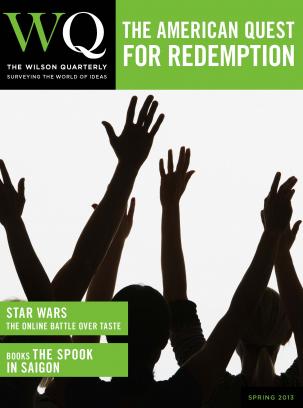The American Quest for Redemption

In a nation born with a sense that it had a redemptive mission in the world, the urge to take what is bad and turn it into something good often turns obsessively inward. The results can be surprising.

In a nation born with a sense that it had a redemptive mission in the world, the urge to take what is bad and turn it into something good often turns obsessively inward. The results can be surprising.
The ceaseless quest for redemption in politics and culture is one of the chronic infirmities of American national life. But God forbid we should ever give it up.
The mass warehousing of convicts is a sign of America’s faltering belief in second chances. Considering how individuals atone for their crimes can help us restore rehabilitation as an ideal.
There is a booming market for self-improvement guides among Americans eager to redeem themselves from the sins of sloth, gluttony, or general discontent. But what qualifies one person to tell another how best to live?
Online review culture is dotted with black holes of bad taste.
Pulling back from America’s global commitments would amount to a “massive experiment.”
On the unlikely origins of the slide guitar.
Print encyclopedias once occupied a privileged cultural position—even if owners seldom consulted them.
The folly of neo-environmentalism.
Did genetic diversity play a decisive role in determining which lands would hit the economic jackpot?
Swallow at your own risk.
Moving poor people to better neighborhoods has a surprising effect.
Until the Civil War, hasty burials on the battlefield were the norm.
A growing number of Americans don’t identify with either political party.
Patents used to protect intellectual property. Now they stifle innovation.
One-third of the world’s poor were not born in poverty. They fell into it.
Congress is surrendering its Constitutional powers to the president.
Does hearing words such as “wrinkles” and “Florida” make you walk like an old person?
The federal stimulus often neglected the areas hit hardest by the recession.
The Afghan economy isn’t strong enough to stand on its own.
The secret to early Jewish success: literacy.
America’s Cold War wizards botched many predictions. But that was often for the better.
Simit, the street food standby, is under threat.
Nicaraguan garbage-pickers are smiling.
Kids tend to let their grades slip when parents pay their college tuition bills.
SHADOW WARRIOR:
William Egan Colby and the CIA.
By Randall B. Woods. Basic Books. 546 pp. $29.99
ON THE MAP:
A Mind-Expanding Exploration of the Way the World Looks.
By Simon Garfield. Gotham. 464 pp. $27.50
TO SAVE EVERYTHING, CLICK HERE:
The Folly of Technological Solutionism.
By Evgeny Morozov. PublicAffairs. 415 pp. $28.99
ADRENALINE
By Brian B. Hoffman. Harvard Univ. Press. 298 pp. $24.95
HOPE AGAINST HOPE:
Three Schools, One City, and the Struggle to Educate America’s Children.
By Sarah Carr. Bloomsbury. 316 pp. $27.00